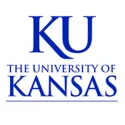Since its founding, the University of Kansas has embodied the aspirations and determination of the abolitionists who settled on the curve of the Kaw River in August 1854. Their first goal was to ensure that the new Kansas Territory entered the union as a free state. Another was to establish a university.
Today, KU has become a major public research and teaching institution of 28,401 students and 2,600 faculty on five campuses (Lawrence, Kansas City, Overland Park, Wichita, and Salina). Its diverse elements are united by their mission to educate leaders, build healthy communities, and make discoveries that change the world.
Visit the university website.
